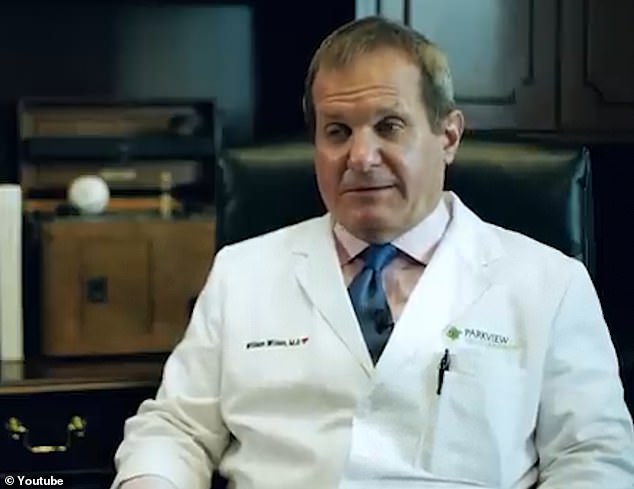[ad_1]
The little-known symptoms of a heart attack people should never ignore have been highlighted by a senior cardiologist, after he suffered from one himself.
Dr William Wilson said he simply couldn’t believe he was experiencing the serious medical emergency despite his vast knowledge of the organ.
He recalled thinking: ‘This can’t be happening to me, I’m a cardiologist.’
The medic, who works at Parkview Health hospital in the US state of Indiana, was 63 at time and said he was in ‘awesome’ health, not smoking, regularly exercising and no obvious risk factors.
But that all changed when he joined his wife for a morning workout in January 2018.
While he said he was feeling great and—in all honesty—not pushing himself hard on an exercise machine, he started experiencing a strange sensation.
Rather than chest pain—a classic heart attack sign—Dr Wilson struck by a creeping but mild sense of physical unease.
‘It didn’t just hit me, boom, in one second,’ he said in a YouTube video.

Dr William Wilson said he simply couldn’t believe he was experiencing the serious medical emergency despite his vast knowledge of the organ
‘It was chest discomfort and it wasn’t a sharp discomfort. It wasn’t like a knife or anything like that, it was just an uncomfortable, oppressive pressing discomfort.
Another symptom he experienced—which is a well-known heart attack sign—was a sudden wave of sweating.
‘For the amount of exercise I was doing, I was dripping in sweat,’ he said.
Dr Wilson added he was also struck by another classic heart attack sign, an ‘overwhelming sense of doom’ with NHS describing this sensation as feeling similar to a panic attack.
Finally, he recounted experiencing a little known symptom of a heart attack.
‘It’s very common when people are having a heart attack, that they have to go to the bathroom really bad.’
‘It’s part of the whole nervous system thing with a heart attack that’s activated.
‘And so sure enough I had to go to the bathroom at the gym.’

While some warning signs are easy to spot — such as severe chest pain — others are more vague and hard to pinpoint. The NHS issued a public appeal after the pandemic
Becoming emotional he then added: ‘And I just was…I prayed.’
Heart attack patients often feel a sudden need to urinate or defecate as the strain the body experiences disrupts the control of bodily functions.
Ironically Dr Wilson didn’t follow the best advice for a suspected heart attack which is to call 999 in the UK and 911 in the US immediately to get help as soon as possible.
He shared how he initially refused to believe he was suffering the medical emergency for about 10minutes despite his vast knowledge about the symptoms.
‘You would think I would know what this is and of course I did, but not for about 30 or 60 seconds.’
‘I was in denial. I was trying to talk myself out of this and say “this isn’t happening, this can’t be happening to me”.
‘I mean I’m a cardiologist this doesn’t happen to cardiologists.’
Emerging from the bathroom Dr Wilson told his wife he was having a heart attack.
He described her reaction as ‘awesome’ as she took charge both calling the emergency room and helping him get there as quickly as possible.
Dr Wilson said rapid access to expert help was a key factor in surviving a heart attack and this had been a factor in his own recovery.
‘The key is for treating a heart attack is getting to the hospital as quickly as you can,’ he said.
‘Once you’re there then the cardiology team and the hospital team will take it from there.’
He admitted he had been very fortunate.
‘It could have gone a totally different way and I’m lucky to be alive.’
An estimated 270 people are admitted to hospital with a heart attack each day in the UK according to the British Heart Foundation.
About 175,000 Britons die from heart and circulatory diseases each year in the UK, equivalent to 480 per day and more than the city of Oxford.

NHS data shows a rise in the number of younger adults suffering from heart attacks over the past decade. The biggest increase (95 per cent) was recorded in the 25-29 year-old demographic, though as numbers of patients are low even small spikes can look dramatic
In the US a person has a heart attack every 40 seconds, which is about 800,000 people per year.
Heart disease is one of the leading causes of death in the US, killing just over 700,000 people per year.
It comes as heart attacks, particularly among young people, are on the rise in the UK with experts blaming factors like rising obesity levels as well as smoking and alcohol consumption.
A heart attack is a critical medical emergency where the supply of blood to the organ is suddenly blocked.
This is usually because of a clot, which cab form because of a build-up of fatty material in major blood vessels.
Symptoms of heart attack include chest pain, lightheadedness or dizziness, sweating, shortness of breath, nausea or vomiting, anxiety and coughing or wheezing.
Anyone experiencing these symptoms should contact 999 for advice and a potential ambulance.
While waiting for an ambulance patients can be advised to take an aspirin as this can improve blood flow to the heart.
Like Dr Wilson, the NHS advises people to call 999 if they or someone they are with thinks they are having a heart attack as fast action can boost survival chances.
[ad_2]
This article was originally published by a www.dailymail.co.uk . Read the Original article here. .

